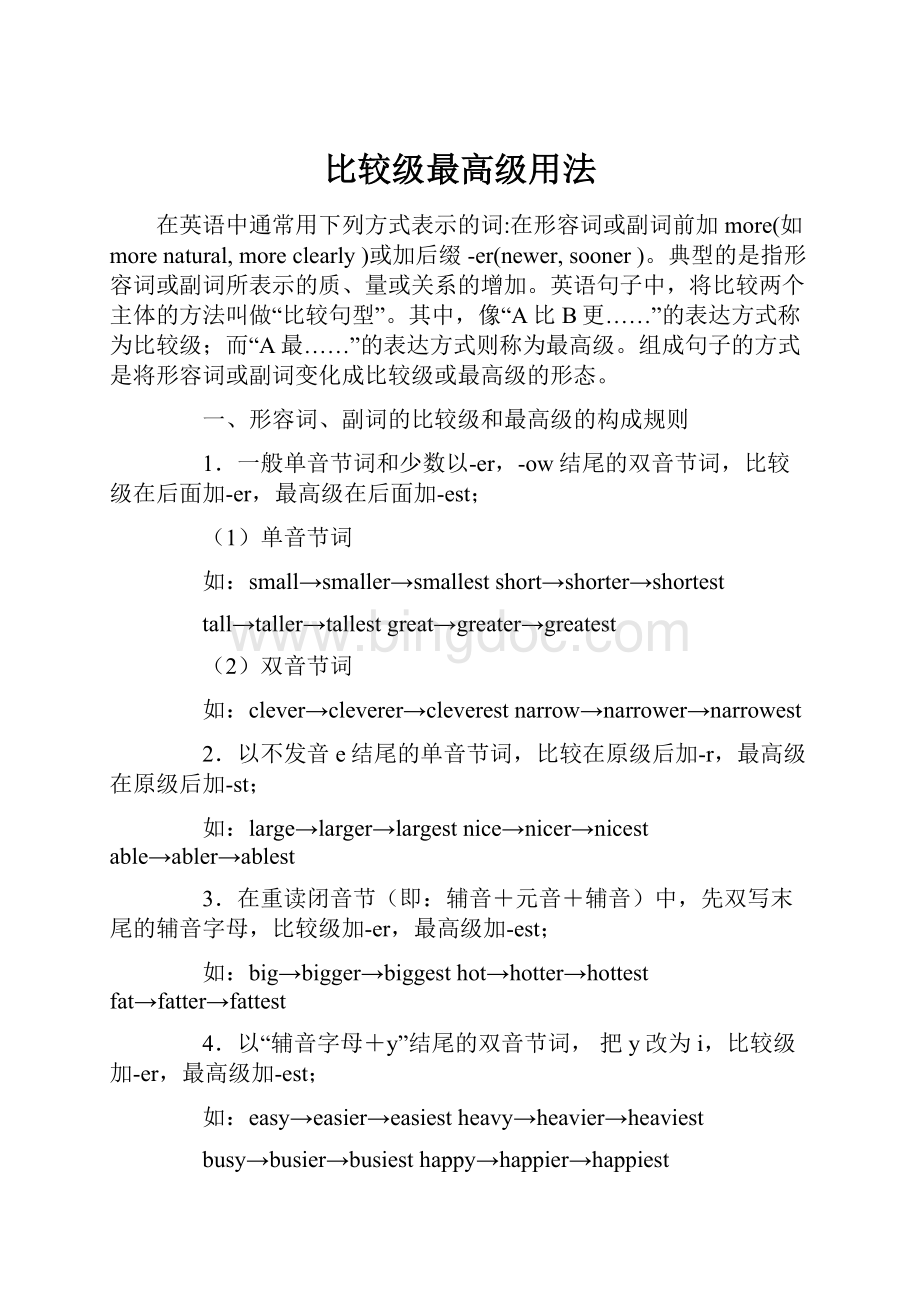比较级最高级用法.docx
《比较级最高级用法.docx》由会员分享,可在线阅读,更多相关《比较级最高级用法.docx(20页珍藏版)》请在冰点文库上搜索。

比较级最高级用法
在英语中通常用下列方式表示的词:
在形容词或副词前加more(如morenatural,moreclearly)或加后缀-er(newer,sooner)。
典型的是指形容词或副词所表示的质、量或关系的增加。
英语句子中,将比较两个主体的方法叫做“比较句型”。
其中,像“A比B更……”的表达方式称为比较级;而“A最……”的表达方式则称为最高级。
组成句子的方式是将形容词或副词变化成比较级或最高级的形态。
一、形容词、副词的比较级和最高级的构成规则
1.一般单音节词和少数以-er,-ow结尾的双音节词,比较级在后面加-er,最高级在后面加-est;
(1)单音节词
如:
small→smaller→smallestshort→shorter→shortest
tall→taller→tallestgreat→greater→greatest
(2)双音节词
如:
clever→cleverer→cleverestnarrow→narrower→narrowest
2.以不发音e结尾的单音节词,比较在原级后加-r,最高级在原级后加-st;
如:
large→larger→largestnice→nicer→nicestable→abler→ablest
3.在重读闭音节(即:
辅音+元音+辅音)中,先双写末尾的辅音字母,比较级加-er,最高级加-est;
如:
big→bigger→biggesthot→hotter→hottestfat→fatter→fattest
4.以“辅音字母+y”结尾的双音节词,把y改为i,比较级加-er,最高级加-est;
如:
easy→easier→easiestheavy→heavier→heaviest
busy→busier→busiesthappy→happier→happiest
5.其他双音节词和多音节词,比较级在前面加more,最高级在前面加most;
如:
beautiful→morebeautiful→mostbeautiful
different→moredifferent→mostdifferent
easily→moreeasily→mosteasily
注意:
(1)形容词最高级前通常必须用定冠词the,副词最高级前可不用。
例句:
TheSaharaisthebiggestdesertintheworld.
(2)形容词most前面没有the,不表示最高级的含义,只表示"非常"。
Itisamostimportantproblem.
=Itisaveryimportantproblem.
6.有少数形容词、副词的比较级和最高级是不规则的,必须熟记。
如:
good→better→bestwell→better→best
bad→worse→worstill→worse→worst
old→older/elder→oldest/eldest
many/much→more→mostlittle→less→least
far→further/farther→furthest/farthest
二、形容词、副词的比较级和最高级的用法
1.“A+be+形容词比较级+than+B”意思为“A比B更……”。
如:
Thistreeistallerthanthatone.这棵树比那棵树高。
注意:
①在含有连词than的比较级中,前后的比较对象必须是同一范畴,即同类事物之间的比较。
②在比较级前面使用much,表示程度程度“强得多”。
如:
Awatermelonismuchbiggerthananapple.
③very,quite一般只能修饰原级,不能修饰比较级。
2.“比较级+and+比较级”或“moreandmore+原级”表示“越来越……”
如:
Itbecomeswarmerandwarmerwhenspringcomes.
春天来了,天气变得越来越暖和了。
Itisgettingcoolerandcooler.
天气越来越凉爽。
Thewindbecamemoreandmoreheavily.
风变得越来越大。
Ourschoolisbecomingmoreandmorebeautiful.
我们的学校变得越来越美丽。
3.在含有or的选择疑问句中,如果有两者供选择,前面的形容词要用比较级形式。
如:
Whoistaller,TimorTom?
谁更高,Tim还是Tom?
4.“the+比较级……,the+比较级”,表示“越……越……”。
Themoremoneyyoumake,themoreyouspend.
钱你赚得越多,花得越多。
Thesooner,thebetter.
越快越好。
5.表示倍数的比较级用法:
①.Ais…timesthesize/height/length/widthofB.
如:
Thenewbuildingisthreetimestheheightoftheoldone.
这座新楼比那座旧楼高三倍。
(新楼是旧楼的四倍高)
②.Ais…timesasbig/high/long/wide/largeasB.
如:
AsiaisfourtimesaslargeasEurope.
亚洲是欧洲的四倍大。
(亚洲比欧洲大三倍)
③.Ais…timeslarger/higher/longer/widerthanB.
如:
Ourschoolistwicebiggerthanyours.
我们学校比你们学校大两倍。
6.形容词、副词的最高级形式主要用来表示三者或三者以上人或事物的比较,表示“最……”的意思。
句子中有表示范围的词或短语。
如:
ofthethree,inourclass等等。
如:
Heisthetallestinourclass.
他在我们班里是最高的。
7."否定词语+比较级","否定词语+so…as"结构表示最高级含义。
Nothingissoeasyasthis.
=Nothingiseasierthanthis.
=Thisistheeasiestthing.
8.比较级与最高级的转换:
Mikeisthemostintelligentinhisclass.
Mikeismoreintelligentthananyotherstudentinhisclass
7.修饰比较级和最高级的词
1)可修饰比较级的词
①.abit,alittle,rather,much,far,byfar,many,alot,lots,agreatdeal,any,still,even等。
②.还可以用表示倍数的词或度量名词作修饰语。
③.以上词(除byfar)外,必须置于比较级形容词或副词的前面。
注意:
使用最高级要注意将主语包括在比较范围内。
(错)Tomisthetallestofhisthreebrothers.
(对)Tomisthetallestofthethreebrothers.
2)下列词可修饰最高级:
byfar,far,much,mostly,almost。
Thishatisnearly/almostthebiggest.
注意:
a.very可修饰最高级,但位置与much不同。
Thisistheverybest.
Thisismuchthebest.
b.序数词通常只修饰最高级。
Africaisthesecondlargestcontinent.
8.要避免重复使用比较级。
(错)Heismoreclevererthanhisbrother.
(对)Heismorecleverthanhisbrother.
(对)Heisclevererthanhisbrother.
9.要避免将主语含在比较对象中。
(错)ChinaislargerthatanycountryinAsia.
(对)ChinaislargerthananyothercountryinAsia.
10.要注意对应句型,遵循前后一致的原则。
ThepopulationofShanghaiislargerthanthatofBeijing.
Itiseasiertomakeaplanthantocarryitout.
11.要注意冠词的使用,后有名词的时候,前面才有可能有名词。
比较:
Whichislarger,CanadaorAustralia?
Whichisthelargercountry,CanadaorAustralia?
Sheistallerthanhertwosisters.
Sheisthetallerofthetwosisters.
三.典型例题
1)----Areyoufeeling____?
----Yes,I'mfinenow.
A.anywellB.anybetterC.quitegood
D.quitebetter
答案:
B.any可修饰比较级,quite修饰原级,well的比较级为better.
2)Theexperimentwas____easierthanwehadexpected.
A.moreB.muchmoreC.much
D.moremuch
答案:
C.much可修饰比较级,因此B,C都说得通,但easier本身已是比较级,不需more,因此C为正确答案。
3)Iftherewerenoexaminations,weshouldhave___atschool.
A.thehappiesttimeB.amorehappiertime
C.muchhappiesttimeD.amuchhappiertime
答案:
D。
比较级和最高级的用法
1.两者相比(甲=乙),用“as+原级+as”表示
TomisastallasMike.
2.两者相比(甲〈乙),用“notas(so)+原级+as”或“lessthan”表示
Ididn’tdomyhomeworkso(as)carefullyasyou.
Thepictureislessattractivethanthatone.
3.两者相比(甲〉乙),用“比较级+than”表示
Ourcityismorebeautifulthananyothercityinourcountry.
注意:
1)为了避免重复,在从句中常用one,that,those等词来代替前面提过的名词。
TheweatherhereiswarmerthanthatofShanghai.
Theradiosmadeinourfactoryarebetterthanthoseinyourfactory.
2)比较等级应注意避免和包括自己的对象比。
比较级+than+
anyother+ 单数名词
alltheother+ 复数名词
anyoneelse
anyoftheother+ 复数名词
3)如果形容词作定语修饰一个单数可数名词,一般将不定冠词a/an放在形容词之后。
Ourneighbourhas_____ours.
A.asabighouseas
B.asbigahouseas
C.thesamebighouseas
D.housethesamebigas
4)比较级前一般不用冠词,但若表示“两者中较……时”。
比较级前要加定冠词。
若比较级后有名词,常在比较级前加不定冠词,表示泛指。
E.g. 他是两者中较高的一个
Heisthetallerofthetwo.
她唱得真动听!
我可从未听过比这更好的嗓音了。
Howbeautifullyshesings!
Ihaveneverheardabettervoice.
4. 三者或三者以上相比,表示最高级时,用“the+最高级”的结构表示,这种句式一般常有表示比较范围的介词短语。
ZhangHuaisthetallestofthethree.
Heworks(the)hardestinhisclass.
ThatwastheleastexcitingfootballgameI’veeverwatched.
ThishotelisthemostcomfortableI’veeverstayed.
注意:
当最高级的前面无限定词the或有不定冠词a/an时,仅表示“很……,非常……”
Mondayismybusiestday.
星期一是我很忙的一天。
Qingdaoisamost(very)beautifulcoastalcity.
青岛是一个非常美丽的海滨城市。
比较级的一些其他用法
1 倍数表示方法
a) 倍数+as+形容词/副词原级+as
b) 倍数+形容词/副词比较级+than
c) 倍数+the+n.+of
Thisropeisthreetimeslongerthanthatone.(这条绳子比那条长三倍。
)
Thisropeisthreetimesaslongasthatone.(这条绳子是那条绳子的三倍。
)
Thisropeisthreetimesthelengthofthatone.(这条绳子比那条绳子长三倍。
)
2 用形容词比较级的否定形式,从反面来表示最高级,通常译为“没有比……更……”
Nootherbookhasagreatereffectonmylife.
没有哪一本书比这本书对我的影响更大的了。
=Thisbookhasthegreatesteffectonmylife.
考例:
—Goforapicnicthisweekend,OK?
--_____.Ilovegettingclosetonature.
A.Icouldn’tagreemore B.I’mafraidnot.
C.Ibelievenot D.Idon’tthinkso.
3moreandmore 越来越……
Ourcityisgettingbiggerandbigger.
Ourcityisgettingmoreandmorebeautiful.
4themore…themore… 越……就越……
Themoreyoustudy,themoreyouknow.
Thebusiertheoldmanis,thehappierhefeels.
Themoreintelligentstudentsare,themorequicklytheyunderstandideas.
5 可用下列词来修饰形容词的比较级
much alot slightly alittle almost far abit still
课时五祈使句
祈使句指的是表示命令、请求、建议或劝告的句子。
其主语you常省略,谓语动词用原形,句末用感叹号或句号,读降调。
1.肯定的祈使句
(1)动词原形+其他Standup,please.=Pleasestandup.请起立。
(2)Be+n./adj.Beagoodboy!
要做一个好孩子!
Becareful!
=Lookout!
=Takecare!
小心/当心!
(3)Let+宾语+动词原形+其它成分Letmehelpyou.让我来帮你。
Let’sgotoschooltogether.咱们一起上学去吧。
2.否定的祈使句
(1)Don't+动词原形Don'tstandup.别站起来。
Don'tbecareless.别粗心。
Don'tletthemplaywithfire.别让他们玩火。
(2)Let型的否定式有两种:
“Don't+let+宾语+动词原形+其它成分”和“Let+宾语+not+动词原形+其它成分”。
Don'tlethimgo./Lethimnotgo.别让他走。
Letthemnotplaywithfire.别让他们玩火。
(3)no开头,用来表示禁止性的祈使句。
Nosmoking!
禁止吸烟!
Nofishing!
禁止钓鱼!
3.祈使句的强调形式,通常在肯定祈使句式前加上助动词Do。
例如:
Doshutup!
快住口!
4.祈使句的回答祈使句的动作通常是表示将来发生的动作,所以回答祈使句时,一般用will或won’t。
在回答具有否定意义的祈使句时,要注意两点:
1)形式一致(即Yes与will保持一致;No与won’t保持一致)2)意思相反(即Yes是“不”的意思;No是“是”的意思)。
在回答时,要注意分析上下文语境中所提供的条件。
如:
---Don’tgoout,please.It’srainingheavilyoutside.请不要出去。
外面雨下得很大。
----Yes,Iwill.Ihavetomeetmybrotherattheairport.不行,我得去机场接我弟弟。
5.祈使句的反意疑问句
(1)肯定祈使句的反意疑问句反问部分用willyou或won'tyou。
Pleaseopenthedoor,will/won’tyou?
请把门打开,好吗?
(2)否定祈使句的反意疑问句反问部分只用willyou。
Don'tbelateagain,willyou?
别再迟到了,行不行?
(3)以let's开头的祈使句反意疑问句反问部分用shallwe。
Let'sturnontheTV,shallwe?
我们把电视打开,好吗?
<特别注意>只有以let's开头的祈使句的反意疑问句的反问部分才用shallwe,而letus开头的祈使句的反意疑问句的反问部分应为willyou或won'tyou.如:
Letusstayhere,will/won'tyou?
请(你)让我们留在这好吗?
一、单项选择:
1.Please____,they’rehavingameeting.
A.notbesonoisyB.bequiteC.mustn’ttalkD.nospeaking
2.____tomeetmeatthestation.I’llbewaitingthere.
A.NottoforgetB.NotforgetC.ForgetnotD.Don’tforget
3.It’safineday.Let’sgofishing,____?
A.won’tweB.willyouC.don’tweD.shallwe
4.Don’tsmokeinthemeeting-room,____?
A.doyouB.willyouC.canyouD.couldyou
5.–Don’tforgettocometomybirthdaypartytomorrow.-I____.
A.don’tB.won’tC.can’tD.haven’t
6.Ifyouaretired,______arest.
A.haveB.havingC.tohaveD.had
7.______mego.Itisveryimportantforme.
A.DoletB.LetdoC.DoingletD.Todolet
8.Heisnothonest.______believehim.
A.NotB.Don’tC.TonotD.Notto
9._____upearlytomorrow,oryoucan’tcatchthetrain.
A.GettingB.GetC.TogetD.Got
10._____inthestreet.It’sdangerous.
A.NotplayB.NottoplayC.Don’tplayD.Don’ttoplay
11.Please______mesomemoney,willyou?
A.lendB.lendingC.borrowD.borrowing
12.Thefilmisabouttobegin.Please______seated.
A.beB.areC.isD.being
13.____downtheradio.Thebaby’sasleepinthenextroom.
A.TurningB.ToturnC.TurnedD.Turn
14.Lucy,____thedoororsomeonewillcomein.
A.closeB.closesC.notcloseD.isclosing
15.____andplayfootballinthestreetafterlunch.
A.Let’snottogoB.Let’snotgoC.Let’sdon’t